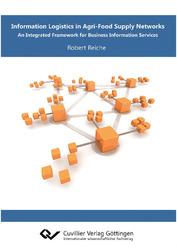| Areas | |
|---|---|
| Serie de libros (96) |
1381
|
| Nachhaltigkeit |
3
|
| Gesundheitswesen |
1
|
| Letra |
2370
|
| Medienwissenschaften | 16 |
| Teología | 57 |
| Filosofía | 102 |
| Derecho | 424 |
| Economía | 851 |
| Ciencias sociales | 418 |
| Ciencias del deporte | 48 |
| Psicología | 233 |
| Educación | 190 |
| Historia | 183 |
| Arte | 111 |
| Ciencias culturales | 166 |
| Literatur | 117 |
| Lingüística | 88 |
| Ciencias Naturales |
5408
|
| Ciencias Ingeniería |
1795
|
| General |
98
|
|
Leitlinien Unfallchirurgie
5. Auflage bestellen |
|
Erweiterte Suche
Information Logistics in Agri-Food Supply Networks (Tienda española)
- Integrated Framework for Business Information Services -
Robert Reiche (Autor)Previo
Indice, Datei (58 KB)
Lectura de prueba, Datei (96 KB)
Agri-food enterprises are challenged by a multitude of complexities. The globalisation and increasing international competition in the food sector, the high degree of small- and medium-sized enterprises, as well as national and cross-national food crises and related uncertainties for consumers and agri-food enterprises lead to different public and private requirements. Transparency on products and inter-enterprise processes has become an important factor for competitiveness and trust in agri-food enterprises and their provided products. The provision of product- and process-related information for the timely discovery of critical situations in the distribution process requires the efficient organisation and coordination of inter-enterprise communication in order to react to these situations directly and effectively. Transparency, in respect to the shared understanding and undistorted access to product- and process-related information, represents an unresolved challenge for the organisation of inter-enterprise communication of relevant information.
The objective of this thesis is to formulate a generic framework for the development of business information services, which connect distributed information sources at agri-food enterprises along the supply network, to provide relevant information to stakeholders to meet their information needs. Within this framework, generic service alternatives for static and dynamically changing information, service activation patterns matching the organisational needs of business interactions, as well as supportive technology components are described to establish this connection. The framework is applied to an application case concentrating on the fresh- fruit and vegetable supply network. Within this application case, three service alternatives are elaborated out of different identified information needs with the objective to provide decentralised stored product-quality and process-related information to users in order to identify deficient products or other critical issues in the distribution process. These services are developed in different levels of technology. An economic decision model is provided for the selection and adoption of technology related to these technology levels based on a generic cost-benefit-analysis and the consideration of the company’s general ability to adopt new technology. The thesis closes with a discussion of different key requirements for the adoption of business information services in the food sector.
| ISBN-10 (Impresion) | 3869559195 |
| ISBN-13 (Impresion) | 9783869559193 |
| ISBN-13 (E-Book) | 9783736939196 |
| Formato | A5 |
| Idioma | Inglés |
| Numero de paginas | 177 |
| Laminacion de la cubierta | mate |
| Edicion | 1 Aufl. |
| Volumen | 0 |
| Lugar de publicacion | Göttingen |
| Lugar de la disertacion | Bonn |
| Fecha de publicacion | 11.11.2011 |
| Clasificacion simple | Tesis doctoral |
| Area |
Ciencias sociales
Informática Horticultura |








